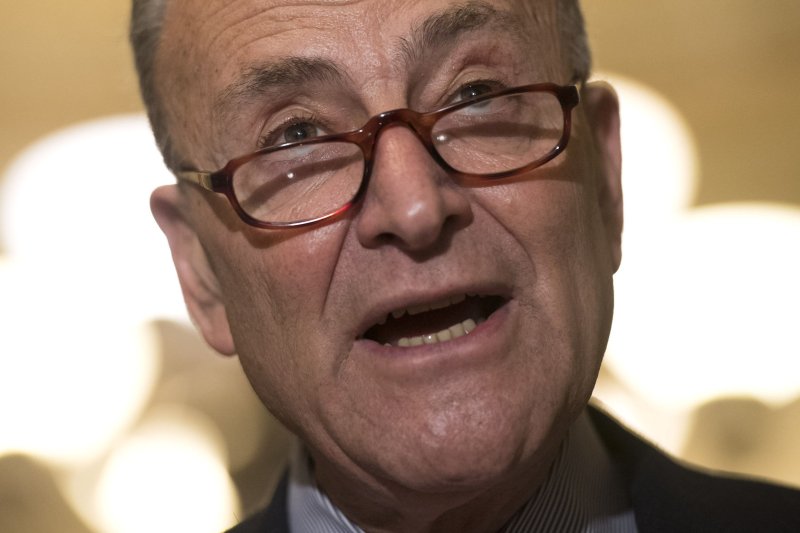Senate Minority Leader Charles Schumer, D-N.Y., said Thursday he plans to vote against the nomination of U.S. Supreme Court nominee Neil M. Gorsuch in the upper chamber -- and said he would lead a filibuster of President Donald Trump's appointee. Such a tactic could lead Republicans to try and change Senate rules to get Gorsuch approved with a simple majority, or 51 votes, instead of a supermajority (60 votes). Photo by Kevin Dietsch/UPI |
License Photo
March 23 (UPI) -- Any notion that U.S. Supreme Court nominee Neil M. Gorsuch might escape serious resistance from Democrats in the Senate in his confirmation may have been stamped out Thursday by the party's top leader in the chamber.
Sen. Chuck Schumer, D-N.Y., said on Thursday that he plans to lead a filibuster of President Donald Trump's high court nominee -- effectively challenging Senate Republicans to try and get Gorsuch confirmed with a simple majority vote.
"After careful deliberation I have concluded that I cannot support Judge Neil Gorsuch's nomination to the Supreme Court," Schumer said. "His nomination will have a cloture vote. He will have to earn 60 votes for confirmation. My vote will be no, and I urge my colleagues to do the same."
A federal judge in the 10th Circuit, Gorsuch appeared again before the Senate Judiciary Committee on Thursday to face questioning in what was expected to be his final day of testimony.
Democrats have been opposed to Gorsuch filling the Supreme Court's vacant ninth seat since he was formally nominated by Trump last month. Many have indicated they may filibuster the appointment when it comes up for a full Senate vote -- which is essentially a stall measure that drags out the process.
To get around a filibuster, Republicans would need a supermajority of 60 votes -- meaning, with just 52 Republican senators, they would need eight Democrats to cross the aisle. Further, Sen. Johnny Isakson, R-Ga., is recovering from back surgery and it's unknown whether he could even vote.
Supreme Court Justice nominee Neil M. Gorsuch testifies during the third day of his confirmation hearing before the Senate Judiciary Committee on Capitol Hill on Wednesday. Photo by Kevin Dietsch/UPI
That means if 41 of the chamber's 48 Democratic voters stick to the filibuster, Majority Leader Mitch McConnell, R-Ky., would have a decision to make.
One avenue for McConnell would be the so-called "nuclear option" -- an attempt to change the rules to bar filibusters for Supreme Court nominees. If that was done, Gorsuch would need only a simple majority of 51 votes. Trump has already asked the majority leader to use the nuclear option if the Democrats try to stall his nomination.
Gorsuch has largely cruised through his confirmation hearings this week and has been given a "well qualified" rating by the American Bar Association, which historically has favored Democratic nominees.
Some Democrats oppose Gorsuch because they view his appointment as a theft of a Supreme Court seat that should have gone to Merrick Garland, former President Barack Obama's nominee last year who was never given a hearing by the GOP-controlled Senate.
"The decisions made in the Senate over the next weeks about Judge Gorsuch, as with any SCOTUS nomination, will echo through that judge's lifetime tenure," Schumer said in a tweet Thursday.
















